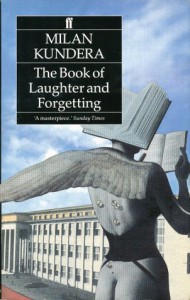
It is difficult to write a coherent note about a novel as complex as this one. Is it even a novel? At a casual glance you'd think not... The chapters are so varied in form, and most of them don't even have any characters in common. The author himself states, however, that the book is an exercise in theme and variation like Beethoven's Op. 111 sonata; and that it is a novel whose main character is Tamina (who appears in person in only two chapters). Tamina is exiled from Czechoslovakia in the wake of the Russian invasion -- the invasion that forms the political background of the entire work. It is a massacre of memory, says Kundera, a purge of historians and history books, and for that reason profound enough assault on Czech identity to make him fear that the nation may be dying... The novel is haunted by forgetting and death. Tamina forgets her husband, the loss of her past leaves her stranded, and when she is offered a chance to move forward to a place without burdens, it is only a horrific death.
As for the other component of the title, laughter? Doesn't laughter sound like a good thing? Not here; there are two kinds of laughter, says Kundera, and this novel is concerned with the laughter of the angels, which is a facsimile of the real thing, and a mark of conformity, infantilization, weightlessness. There are various kinds of sex in this book, too, and it is mostly concerned with the wrong kinds.
I did enjoy reading this, quite a bit. I intend to return to the author when I can.










